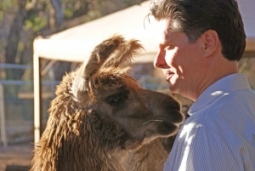
By Miriam Raftery
Image: CC via Bing
February 8, 2024 (San Diego’s East County) – AT&T has filed an application asking the California Public Utilities Commission to end AT&T’s obligation to serve as a carrier of last resort (COLR) and cease maintaining land line telephone service. A map indicates this would include the entire San Diego region. If the CPUC approves the request, land line service could end as early as six months later.
There are no in-person hearings in San Diego County, but you can voice your opinion in a virtual hearing March 19 at 2 p.m. and 6 p.m. or post online comments here.
"If approved by the CPUC, over 580,000 affected AT&T customers would be left with fewer options in terms of choice, quality, and affordability," warns the Rural County Representatives of California. "Alternative services, such as VoIP and wireless, have no obligation to serve a customer or to provide equivalent services to AT&T landline customers, including no obligation to provide reliable access to 911 or Lifeline program discounts."
The proposal has drawn strong opposition from rural residents in East County and elsewhere in California, as well as consumer advocates who warn that ending land lines would leave many in rural or remote locations with no reliable phone service at all, since Internet VOIP phone service is not widely available in many places and some areas also lack cell phone connectivity. Even for those with cell service, land lines have proven life-saving options when cell towers have burned down during wildfires in places such as rural Potrero.
“During the 2003 and 2007 fires, all cell phone communications and power was down, so the ONLY communications we had at our ranch was our land line,” Pine Valley resident Dennis Berglund, an engineer with PriaxCorp., told East County Magazine in an e-mail. “If this proposal is accepted by the CPUC, many rural citizens will not have any means of emergency communications.“ He notes that “cell phone towers and even the fiberoptic feeds do not have reliable backup power.”
The land line does not depend on local power, so you will always have communications,” he adds. This is not true with broadband VOIP alternatives, which fail if power goes out. In our local rural and mountain areas, power outages are frequent --and SDG&E often shuts off power during high fire danger conditions.
Boulevard resident Michelle Strand says she keeps a land line in case of emergency, if cell phone service was disrupted. “I would have peace of mind to be able to call my elderly parents who still have their land line...Most of us that live in the backcountry have this type of mentality to be prepared for emergencies...and to be able to communicate. I find it ironic and maybe even hypocritical that while benefit programs like the Affordable Connectivity Program tout that they are making internet service in rural areas affordable, thus increasing communication, the prospect of taking away landline service from these same people will now reduce communication! It basically boils down to the government will pay for your internet, but wants to take away your home telephone Makes no sense....Without communication, especially during disasters, we are helpless and clueless.”
Earl Goodnight, current Chair of the Boulevard Community Planning Group, says, “Our cell service is spotty in Boulevard; for instance there is no cell service at the Resource Center,” adding that this varies by carrier. He also asks, ”Should this be approved, are they going to leave the wood poles? Many are standing alongside the new recently installed fire hardened SDG&E steel poles.” Wood poles pose fire hazards and some have graffiti, he notes.
For residents very near the international border, cell phones connect to Mexican cell towers--meaning international long distance calling charges, former Boulevard Planning Group Chair Donna Tisdale has told ECM in the past. So cell phones for border residents is not a viable alternative to land lines.
The Utility Reform Network (TURN) and the Center for Accessible Technology (CforAT) have filed as intervenors and urge consumers to oppose the proposal.
The docket for an earlier hearing this week received over 2,300 comments opposed to AT&T's plan. There are another 600 comments on a separate docket for a related AT&T application, Ars Technica reported in a Feb. 6 article titled “Don’t Let Them Drop Us!”
AT&T argues that the mandate for AT&T, but not its competitors, to maintain a system of copper wiring for land lines while simultaneously investing in wireless and broadband phone technologies means AT&T must “wastefully operate and maintain two duplicate networks.” The company also says there is dwindling demand for its land line network.
Kevin Keane, an electrical engineer who has studied telecommunications and worked in the field, says the real problem is that proposed replacement communications systems have shortcomings.
He acknowledges problems in maintaining a land line system that dates back to the steam engine era. “AT&T now has to hunt for spare parts on eBay and flea markets,” he told ECM. “That means the end of landline service cannot be avoided.”
He wants to see a legal mandate for 72-hour backup power for all cell phone towers. In addition, he proposes that either Internet or cell phone providers must be mandated to meet Carrier of Last Resort requirements with “full coverage to every house, including in our valleys. He also wants to see coverage requirements for internet providers be enforced. “Currently, if even just one house in a census tract is covered, Internet providers can claim coverage for the whole census tract.”
Those who have communications that are dependent on electricity can invest in a generator or a solar charger for cell phones, he suggests.
 But that only works if you actually have cell phone service and/or broadband phone service, which many rural areas including some East County communities lack. Several years ago, ECM ran an article about John Klacka, a llama rancher whose prize-winning llama died of a rattlesnake bite while his AT&T land line was temporarily down; he did not have cell service in his rural Jamul home.
But that only works if you actually have cell phone service and/or broadband phone service, which many rural areas including some East County communities lack. Several years ago, ECM ran an article about John Klacka, a llama rancher whose prize-winning llama died of a rattlesnake bite while his AT&T land line was temporarily down; he did not have cell service in his rural Jamul home.
Photo, right: John Klacka and Muneco, prize-winning llama that died of a snakebite when his land line service and internet went down, leaving him without any communication in rural Jamul, which lacked cell phone service.
What if that had been a child in distress, or an adult suffering a heart attack? Or a disabled person needing help to evacuate during a wildfire? Residents without cell phone service or broadband phone service could also be left unable to receive emergency calls including evacuation notices, potentially leading to mass tragedy in the event of a fast-moving wildflire,flood, or other disaster.
Beyond the CPUC regulatory matters, Keane says, “The underlying issue is with the FCC (Federal Communications Commission) “ which consists of five members, usually three from the President’s party including the chair. “Under the previous (Trump) administration, the chair of the FCC, AjitPai, had been actively working to undermine such efforts, even trying to ban states from implementing more consumer-friendly rules,” he says. “The current chair is Jessica Roseworcel. She is pushing for exactly the types of changes you and I are looking for...and depending on the outcome of the next election, Ajit Pai or somebody similar may well end up back as chair of the FCC.”
AT&T is also asking to relinquish its Eligible Telecommunications Carrier designation, meaning it would no longer be able to get federal funds for Lifeline, a federal program to assure phone service for low-income consumers. These consumers could face rate hikes as a result.















Recent comments